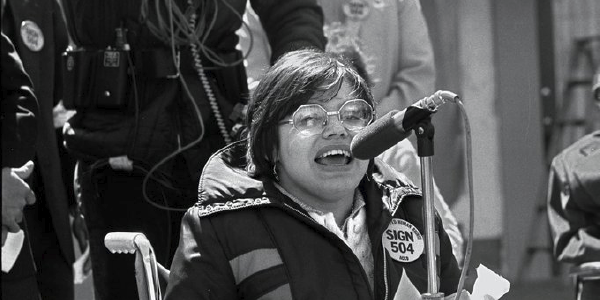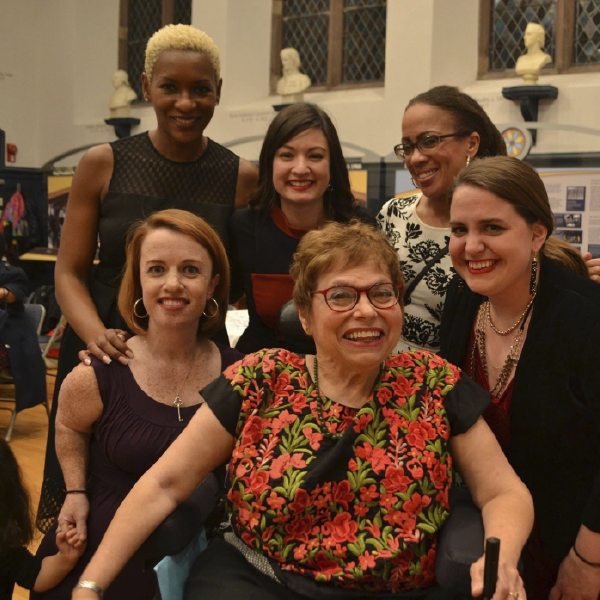
En Español
It is often said that true leaders don’t build followers, they build more leaders. If this is true—and I believe strongly that it is—there is no greater example of a leader than Judith (Judy) Heumann, who passed away on March 4, 2023 at the age of 75.
Judy’s impact was profound. Her name is intertwined with the disability rights movement, and her activism embedded in nearly every policy advancement for people with disabilities in America. These include, of course, efforts to build a more equitable and inclusive workforce—the goal at the forefront of our work at the department’s Office of Disability Employment Policy (ODEP).
If you’ve seen the 2020 award-winning documentary Crip Camp, you know that Judy’s activism started young. As a camper and later counselor at a summer camp in New York for teens with disabilities, she developed and honed her leadership skills and instilled them in others, several of whom would later join her in leading the fight for equal access and opportunity.

As just one of so many examples, Judy helped lead the historic 1977 “504 sit-in” at the San Francisco Federal Building. This demonstration resulted in the long-awaited signing of regulations implementing Section 504 of the Rehabilitation Act of 1973—the 50th anniversary of which we are recognizing this year.
Section 504 prohibits discrimination based on disability in any program or activity receiving federal financial assistance, such as education or employment services, and its implementation was a milestone step in advancing civil rights for people with disabilities. It was the first federal legislation to address the notion of equity for people with disabilities, and it laid the foundation for the more comprehensive Americans with Disabilities Act to come. And Judy was at the heart of it all.
Much will be written and spoken about Judy in the coming days, weeks and years, and undoubtedly all of it will honor her remarkable impact. But in the end, there simply may not be enough words to adequately capture her spirit, love of family and passion for connecting others. She made the world a better place. She was a guiding light to many, me included. I was proud to call her a mentor and friend, and I benefitted greatly from her warmth, wit and wisdom.
I know that I speak for many in the disability community when I say we were not ready for Judy to leave us, and we join her family, including her husband Jorge Pineda, brothers, sisters-in-law and niece and nephew and others, in mourning her loss. But it is because of her extraordinary leadership that we are prepared—and committed—to taking on the torch she lit and carried for so long. Her light shines on, in all of us. That’s the legacy of true leadership, and hers will endure, always.
Taryn M. Williams is the assistant secretary of labor for disability employment policy.
Judy Heumann: El legado del liderazgo
Por: Taryn M. Williams
6 de marzo de 2023
Se dice con frecuencia que los verdaderos líderes no hacen seguidores, sino que hacen más líderes. Si esto es cierto, y creo firmemente que lo es, entonces no hay más grande ejemplo de líder que Judith (Judy) Heumann, quien falleció el 4 de marzo de 2023 a la edad de 75 años.
El impacto de Judy fue profundo. Su nombre está entrelazado con el movimiento por los derechos de las personas con discapacidad, y su activismo estuvo dentro de casi todos los avances de políticas para las personas con discapacidad en Estados Unidos. Esto incluye, naturalmente, los esfuerzos para construir una fuerza laboral más equitativa e inclusiva, que es el objetivo principal de nuestro trabajo en la Oficina de Políticas de Empleo para Personas con Discapacidad (ODEP) del departamento.
Si usted ha visto el documental Crip Camp premiado en el 2020, sabe que el activismo de Judy comenzó de joven. Como campista y luego consejera en un campamento de verano en Nueva York para adolescentes con discapacidades, Judy desarrolló y perfeccionó sus habilidades de liderazgo y las inculcó en otros, algunos de los cuales se unirían a ella para liderar la lucha por la igualdad y oportunidades de acceso.
Por destacar apenas uno de tantos ejemplos, Judy ayudó a liderar la histórica “sentada 50”” de 1977 en el Edificio Federal de San Francisco. Esta demostración que resultó en la tan esperada firma de los reglamentos integrantes de la Sección 504 de la Ley de Rehabilitación de 1973, cuyo 50 aniversario estamos reconociendo este año.
La Sección 504 prohíbe la discriminación en base a discapacidad en cualquier programa o actividad que recibe fondos federales, tales como educación o servicios de empleo, y su implementación fue un hito en el avance de los derechos civiles de las personas con discapacidades. Fue la primera legislación federal que abordó la noción de equidad para personas con discapacidades, y puso las bases para la futura Ley de Americanos con Discapacidades. Judy estuvo en medio de todo.
En los próximos días, semanas y años se escribirá y hablará mucho sobre Judy, e indudablemente todo se centrará en honrar su sobresaliente impacto. Pero al final, simplemente no podrá haber palabras suficientes para adecuadamente capturar su espíritu, amor por la familia y pasión por conectar. Ella hizo de este un mundo mejor. Ella fue luz e inspiración para muchos, incluida yo. Estaba orgullosa de llamarla mentora y amiga, y me beneficié enormemente de su calidez, su ingenio y su sabiduría.
Sé que hablo por muchos en la comunidad de personas con discapacidad cuando digo que no estábamos listos para que Judy nos dejara, y nos unimos en duelo a su familia, incluido su esposo Jorge Pineda, hermanos, cuñadas, sobrina y sobrino y otros. Pero es gracias a su extraordinario liderazgo que estamos preparados, y comprometidos, a asumir la antorcha que ella encendió y portó durante tanto tiempo. Su luz brilla, en todos nosotros. Ese es el legado del verdadero liderazgo, y el suyo perdurará, siempre.
Taryn M. Williams es la subsecretaria de trabajo para la política de empleo de personas con discapacidad.

 U.S. Department of Labor Blog
U.S. Department of Labor Blog



